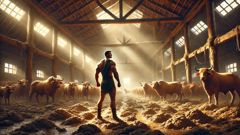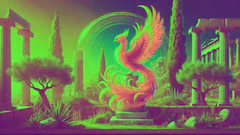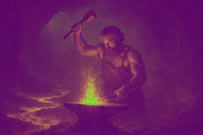Introduction
In the sunlit heart of ancient Greece, amidst the rolling plains and distant blue-green hills of Elis, there stood a palace unlike any other—both for its wealth and for the shadow it cast. The land was renowned for its fertile fields, its olive groves, and its peaceful herds, yet a single building near the palace’s edge had become notorious throughout the Greek world: the Augean Stables. For three decades, the stables had been home to King Augeas’s prized cattle, a herd so vast and sacred that their numbers seemed to multiply with every telling. Yet, despite their beauty and importance, the stables had never once been cleaned. The filth, layered upon itself year after year, became a monument to neglect—a festering challenge that even the bravest dared not approach.
It was to this place that Heracles, son of Zeus and the mightiest of all heroes, journeyed at the command of King Eurystheus. Having already faced beasts, monsters, and impossible odds, Heracles found himself confronted not with a foe of claws and fangs, but with a mountain of filth and the stench of old neglect. His fifth labor seemed simple on paper: cleanse the Augean Stables in a single day. Yet to those who knew of the task, it was a punishment wrapped in humiliation, a test designed to break even the strongest spirit. But Heracles was not one to turn away from adversity. As he strode into Elis, the first rays of dawn glinting off his lion-skin cloak, whispers followed in his wake. Some pitied the hero, others smirked at the supposed simplicity of his trial, but all watched with bated breath, wondering if even Heracles could prevail against a task so foul.
The city of Elis bustled with anticipation, merchants pausing in the marketplace, shepherds halting by the roadside, and even the palace servants peering from behind marble columns. All eyes turned toward the stables, where years of decay and the overwhelming force of nature had created an obstacle more formidable than any hydra or lion. The air hung heavy, thick with expectation and an unspoken question: Would Heracles rely solely on his legendary strength, or would he find another way to conquer this trial? As the stables loomed on the horizon—vast, reeking, seemingly insurmountable—Heracles tightened his grip on his club, his gaze steady, his mind already seeking the spark of inspiration that had guided him through his previous labors. And so, beneath the eternal sky of Greece, the stage was set for a feat that would echo through history as a testament to human ingenuity and resolve.
The Challenge: Filth Beyond Measure
The stench of the Augean Stables greeted Heracles before he ever set eyes on the structure itself. As he neared the low stone walls that encircled the cattle’s domain, he felt the oppressive weight of years’ worth of filth—a pungent, fetid mass that seemed almost alive with the heat of the morning. It was no mere pile of manure; it was a living testament to neglect, a challenge that mocked those who would attempt its conquest. The stables stretched wider than most palaces, their thatched roofs patched in haste, their beams warped with age. Herds of cattle grazed idly nearby, their flanks glossy and eyes innocent, as if unaware of the spectacle that surrounded their home.
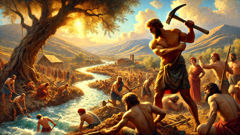
Villagers and royal servants lingered at a distance, covering their faces with cloths and exchanging doubtful glances. Some whispered that the task was beneath a hero of Heracles’s stature. Others speculated that not even the gods could clear such filth in a day. Yet Heracles, his brow furrowed in determination, did not hesitate. He strode up to the entrance, surveying the enormity of the task, every sense assaulted by the foulness within.
Inside, the muck was layered in thick, sticky strata, a miasma rising from every surface. The floor was lost beneath sludge, and the air shimmered with the haze of decay. Heracles understood that no shovel or rake would suffice. Even with his legendary strength, he could labor for weeks without making a dent. And so he stood silent for a long moment, his mind racing through possibilities. The sun crept higher in the sky as villagers awaited a miracle—or, at least, a spectacle.
King Augeas himself emerged from his palace, resplendent in rich robes, his face set in a smug half-smile. He greeted Heracles with feigned warmth, but there was no mistaking the malice behind his words. “If you succeed, mighty Heracles, I will reward you with a tenth of my cattle. But should you fail, your reputation will be forever tarnished.” The king’s son, Phyleus, hovered at his father’s side, eyes flickering with concern and an uneasy admiration for the hero.
Heracles nodded, accepting the terms without protest. To him, the reward was secondary; the real battle was against impossibility itself. Alone at the threshold of the stables, Heracles paced and pondered. The ground beneath him trembled ever so slightly—a reminder of the rivers Alpheus and Peneus that flowed nearby, their waters swift and untamed. Suddenly, an idea took shape in his mind: why rely solely on brute force when nature’s own strength might serve him better? With renewed purpose, Heracles strode into the filth, measuring the flow of water in his thoughts and mapping the land with his eyes.
The Plan Unfolds: Harnessing Rivers, Outwitting Kings
While others might have despaired at the insurmountable filth, Heracles saw only opportunity. He left the stables and walked the perimeter of Augeas’s lands, observing the courses of the nearby rivers. The Alpheus thundered through wooded valleys to the north, its waters deep and forceful even in summer. The Peneus wound through low meadows to the south, its current swift and lively. Heracles knelt by their banks, scooping handfuls of water, studying their flow and imagining how their strength could be redirected.
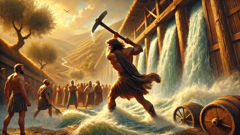
Returning to the palace, Heracles sought audience with King Augeas and his council. “I will cleanse your stables,” he declared, “but I must have leave to alter the land, to dig where I must and shape the rivers as I see fit.” Augeas, ever eager to see Heracles humbled, agreed without considering the implications. The courtiers murmured, amused and dismissive; surely no man could reroute rivers in a day.
Heracles wasted no time. He rallied a handful of sturdy laborers—skeptical at first, but inspired by his presence—and together they gathered tools: shovels, picks, axes. Guided by Heracles’s strength and vision, they began to carve two great trenches from the riverbanks toward the stables. The sun blazed overhead, sweat stinging their eyes as they dug through rocky earth and tangled roots. Heracles himself swung pick and spade with tireless vigor, his muscles bunching and flexing as he tore through obstacles that would have halted any other man.
As the trenches deepened, villagers gathered to watch, drawn by the spectacle of man challenging nature. Heracles encouraged his helpers, never faltering in his work. The channels grew wider, and soon the roar of distant water grew audible. As dusk neared, Heracles paused at the river’s edge. With a mighty heave, he shifted the course of the Alpheus, guiding its flood into the waiting trench. The river surged forward with a thunderous roar, racing toward the stables.
Within moments, the water crashed through the stable walls, sweeping away years of filth in an unstoppable torrent. Muck and manure dissolved beneath the onslaught, churning out through the opposite side where Heracles had prepared an exit trench leading back to the Peneus. The stables trembled but stood firm as waves of water washed clean every stone and beam.
The people of Elis gasped in awe, their disbelief giving way to wild cheers. Even Augeas, watching from his balcony, was struck silent by the magnitude of Heracles’s solution. By sunset, the stables sparkled in the fading light—cleaner than they had been since the day they were built. Where once there had been despair and rot, now flowed fresh air and hope.
The Aftermath: Deceit, Justice, and the Hero’s Legacy
Morning broke over Elis, bathing the cleansed stables in golden light. The air was fresh for the first time in memory, and the cattle wandered freely across pristine straw. Heracles stood amid the ruins of filth and neglect, his work done yet his heart heavy with anticipation. For he knew that success often breeds resentment among those who expected failure.
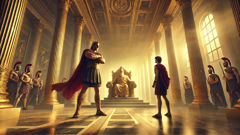
King Augeas summoned Heracles to the palace. The hall was filled with courtiers, and Phyleus, the king’s son, stood beside his father, his expression troubled. Augeas addressed the assembly: “Heracles has cleansed my stables, but he has not done so with his own hands! He has defiled my land, diverted sacred rivers, and endangered my herds. Therefore, I deny him any reward.”
A hush fell over the crowd. Heracles stood tall, meeting Augeas’s gaze without flinching. “You set the task,” he replied. “You agreed to the terms. I have accomplished what no one else dared attempt. Do not let pride make you a liar before your people.”
Phyleus stepped forward. “Father, I witnessed the bargain. I saw Heracles labor with his own hands, and I saw him cleanse the stables as promised.” But Augeas would not be moved. He dismissed both Heracles and his own son from the palace in anger, banishing Phyleus for his honesty and refusing Heracles his reward.
The people of Elis murmured in dismay. They had seen the miracle with their own eyes; they knew Heracles’s labor had saved their city from ruin. Yet the power of kings often outweighed the truth, and Heracles found himself forced to depart with nothing but his reputation intact.
Still, word of his feat spread far beyond Elis. In every village and city, travelers recounted how Heracles had used wisdom as well as strength to solve an impossible problem. Some called it a miracle, others a lesson in human ingenuity. The name of Heracles became synonymous not only with might but with resourcefulness—a hero who could turn even nature’s fury to his advantage.
As Heracles journeyed on to his next labor, he found comfort in the gratitude of the people and the clear air he had left behind. Phyleus, though exiled, was remembered as a prince of integrity. And King Augeas, despite his deceit, was forever marked by the memory of a challenge bested by a hero’s mind as much as his muscle. Thus, the legend of the Augean Stables endured: a tale not merely of cleaning filth, but of overcoming adversity with courage, creativity, and unwavering resolve.
Conclusion
The tale of Heracles and the Augean Stables has endured not just for its spectacle, but for its lesson in perseverance and ingenuity. Heracles faced a challenge designed to humiliate him—a task deemed impossible by all who witnessed it. Yet he refused to accept the limits others placed before him. Instead of relying solely on brute strength, he observed, reflected, and found inspiration in the natural world. By harnessing the power of the rivers, he transformed an insurmountable problem into a triumph that benefited not only himself but the people of Elis. Though he was denied his promised reward by a king blinded by pride, Heracles’s true victory lay in the respect he earned and the legacy he forged. His story reminds us that sometimes, the greatest strength lies not in muscle or might, but in the courage to think differently and persist when the world expects you to fail. The stables stand clean, the rivers flow on, and Heracles’s name lives forever—a beacon of hope for all who face challenges that seem too great to overcome.

